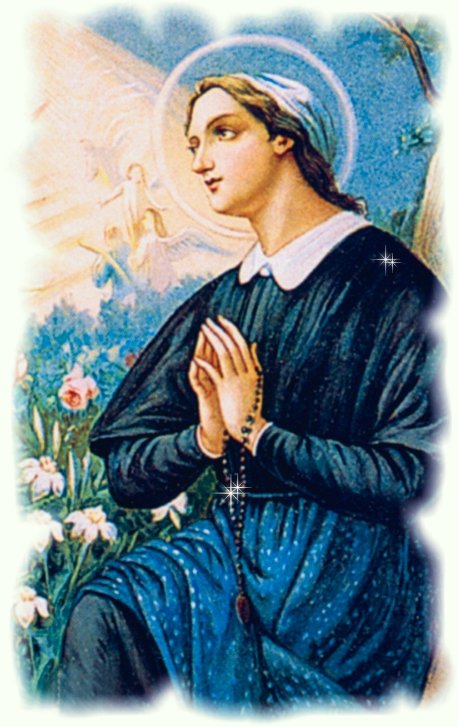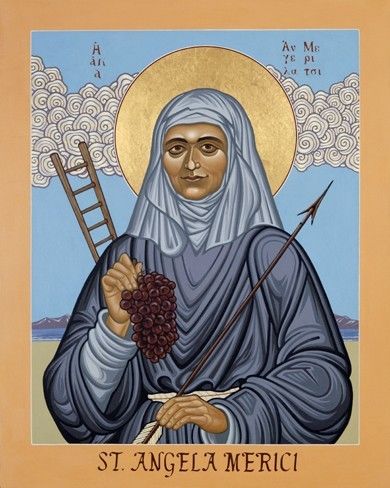saint of the day(Saint Angela Merici)
Saint Angela Merici
Born 21 March 1474
Desenzano del Garda, Province of Brescia, Republic of Venice
Died 27 January 1540 (aged 65)
Brescia, Republic of Venice
Beatified 30 April 1768, Rome, Papal States by Pope Clement XIII
Canonized 24 May 1807, Rome, Papal States by Pope Pius VII
Major shrine Sanctuary of St. Angela Merici, Brescia, Italy
Feast 27 January; 31 May (1861-1955); 1 June (1955-1969)
Attributes cloak, ladder
Patronage sickness, handicapped people, loss of parents
Women like St. Teresa of Ávila and St. Catherine of Genoa contributed significantly to the Catholic Reformation. But in the 16th-century church perhaps no woman responded more creatively to the need for reform than St. Angela Merici. She built communities that trained single women in Christian living and provided them a secure place of honor in their local societies. A single lay woman herself, Angela established groups of unmarried women of all classes in Brescia and other northern Italian cities. She wanted the women to be in the world, but not of it. So they consecrated themselves to God and promised to remain celibate. But they lived at home with their families and looked for ways to serve their neighbors. In 1535, Angela organized the groups into the Company of St. Ursula, later called the Ursulines. Unique for its time, her avant-garde association anticipated modern secular institutes and covenant communities. Angela gave the Ursulines a military structure, dividing towns into districts governed hierarchically by mature Christian women. This design allowed the community to support members in daily Christian living and protect them from spiritually unhealthy influences. The rule that Angela wrote for the company required members to remain faithful to the Christian basics. In the following excerpt, she explains the importance of daily vocal and mental prayer:
Each one of the sisters should be solicitous about prayer, mental as well as vocal, that is a companion to fasting. For Scripture says prayer is good with fasting. As by fasting we mortify the carnal appetites and the senses, so by prayer we beg God for the true grace of spiritual life. Thus, from the great need we have of divine aid, we must pray always with mind and heart, as it is written, “Pray constantly” (1 Thessalonians 5:17 NJB). To all we counsel frequent vocal prayer that prepares the mind by exercising the bodily senses. So each one of you, every day will say with devotion and attention at least the Office of the Blessed Virgin and the seven penitential psalms (Psalm 6, 32, 38, 51, 102, 130, and 143) because in saying the office we are speaking with God.

To afford matter and some method in mental prayer, we exhort each one to raise her mind to God and to exercise herself in it every day. And so in the secret of her heart, let her say: “My Savior, illumine the darkness of my heart, and grant me grace rather to die than to offend your Divine Majesty any more. Guard, O Lord, my affections and my senses, that they may not stray, nor lead me away from the light of your face, the satisfaction of every afflicted heart.
“I ask you, Lord, to receive all my self-will that by the infection of sin is unable to distinguish good from evil. Receive, O Lord, all my thoughts, words, and deeds, interior and exterior, that I lay at the feet of your Divine Majesty. Although I am utterly unworthy, I beseech you to accept all my being.”
At Angela Merici’s death in 1540 she had started 24 groups. Over the years the Ursulines have flourished as the oldest and one of the most respected of the church’s teaching orders.
During her life, Merici had often prayed at the tombs of the Brescian martyrs at the Church of St. Afra in Brescia. She lived in small rooms attached to a priory of the Canons Regular of the Lateran. According to her wishes, after her death, she was interred in the Church of St Afra to be near the martyrs' remains. There her body remained until the complete destruction of this church and its surrounding area by Allied bombing during the Second World War, on 2 March 1945, in which the parish priest and many townspeople died. The church and corresponding buildings were afterwards rebuilt, and reopened on 10 April 1954. The church was consecrated on January 27, 1956, with a new dedication to St. Angela Merici, while the Parish of St. Afra was transferred to the neighboring Church of St. Eufemia.[7]
Merici was beatified in Rome on 30 April 1768, by Pope Clement XIII. She was later canonized on 24 May 1807 by Pope Pius VII.

Feast Day
Merici was not included in the 1570 Tridentine Calendar of Pope Pius V, because she was not canonized until 1807. In 1861 her feast day was included in the Roman Calendar – not on the day of her death, 27 January, since this date was occupied by the feast day of St. John Chrysostom, but instead on 31 May. In 1955 Pope Pius XII assigned this date to the new feast of the Queenship of Mary, and moved Merici's feast to 1 June. The celebration was ranked as a Double until 1960, when Pope John XXIII gave it the equivalent rank of Third-Class Feast.
Lastly, in the major 1969 reform of the liturgy, Pope Paul VI moved the celebration, ranked as a Memorial, to the saint's day of death, 27 January.
.jpg)
Bibliograph
Q. Mazzonis, "The Impact of Renaissance Gender-Related Notions on the Female Experience of the Sacred: The Case of Angela Merici's Ursulines," in Laurence Lux-Sterritt and Carmen Mangion (eds), Gender, Catholicism and Spirituality: Women and the Roman Catholic Church in Britain and Europe, 1200–1900 (Basingstoke, Palgrave Macmillan, 2011),